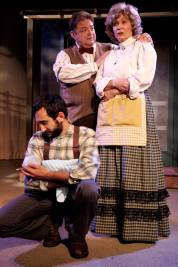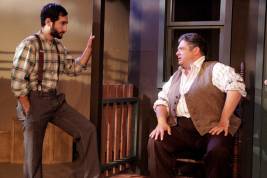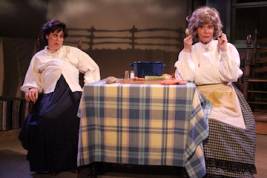
From the rear of the Pico Playhouse comes a foreign-accented male voice singing a beautiful, mournful refrain: “The stars can see what we cannot, the stars remember what we forgot. See that shining spark. God is there in the dark…” Little by little, a slight, bearded figure enters our field of vision, pushing a cart filled with ripening bananas down the center aisle.
 Meet Haskell Harelik, the title character of Steven M. Alper and Sarah Knapp’s exquisite chamber musical The Immigrant, the compelling, still relevant tale of four very different people whose lives intersect a hundred or so years ago on the dry, wide-open Texas plains.
Meet Haskell Harelik, the title character of Steven M. Alper and Sarah Knapp’s exquisite chamber musical The Immigrant, the compelling, still relevant tale of four very different people whose lives intersect a hundred or so years ago on the dry, wide-open Texas plains.
The musicalization of Mark Harelik’s play of the same name (with book by Harelik, music by Alper, and lyrics by Knapp), The Immigrant tells the true story of actor/playwright Harelik’s grandfather’s first three decades in the United States.
Haskell (Gary Patent) is hard at work selling “‘Pananas’ A Penny A Piece” in rural Hamilton, Texas when he meets the town banker Milton (Anthony Gruppuso) and his salt-of-the-earth wife Ima (Cheryl David). Despite scarcely knowing a word of English, Haskell manages to communicate to the American couple that he would like to wash his schmutzig hands … and rent a room in their house if they’ve got one available.
Milton wants nothing to do with the stranger, but Ima invites Haskell into their home, warm-hearted and welcoming until Milton informs her that their guest is … a Jew. When Ima responds, “It never occurred to me that he was a Jew,” Milton retorts with a smile and a wink, “Well, I saw his horns, honey. What’s wrong with you?”, proving that things are not nearly as black and white in Hamilton, Texas as they might seem at first glance.
As the months pass, Haskell learns English—and local culture—from his American friends, even as the Texas couple have their eyes opened by this unassuming yet enterprising foreigner to the worlds outside Hamilton.
Much of Milton and Ima’s discussion of the merits/drawbacks of befriending Haskell takes place in song. In fact, one of The Immigrant’s strongest suits is the way Alper and Knapp have integrated dialog from Harelik’s play into a dozen and a half musical numbers, each of which is an integral part of the story being told.
Soon, everyone is buying Haskell’s bananas, and Haskell writes to his wife Leah (Dana Shaw) about his wonder at “living in the house of a banker!” Life may not be easy in a strange new land with “no shul, no Rabbi, and no Jews,” but at least Haskell is safe here, safe from the pogroms that killed so many of his fellow Jews in his native Russia.
 The song “Changes” has banker Milton advising Haskell that “your fruit, it rots. It’s not worth the trouble. Sell them notions, sell them sundries,” and before too long Haskell has bought his own dry goods shop, the better to be off the road where danger may lie hidden. He has also traded in clothes which mark him as a Jew for outfits that allow him to fit in, a change that hardly sits well with his wife Leah, freshly arrived in Texas and not at all pleased with her husband’s efforts at assimilation.
The song “Changes” has banker Milton advising Haskell that “your fruit, it rots. It’s not worth the trouble. Sell them notions, sell them sundries,” and before too long Haskell has bought his own dry goods shop, the better to be off the road where danger may lie hidden. He has also traded in clothes which mark him as a Jew for outfits that allow him to fit in, a change that hardly sits well with his wife Leah, freshly arrived in Texas and not at all pleased with her husband’s efforts at assimilation.
Haskell and Leah’s acclimatization to America, the birth of their three American sons (one of them the playwright’s father), their friendship with Milton and Ima, and Haskell’s later estrangement from Milton make for an emotional journey in which all four characters end up learning from each other, and growing in the process.
It may take audiences a while to accustom themselves to Alper’s complex musical score, one which bears a resemblance to Adam Guettel’s Floyd Collins and The Light In The Piazza—with an occasional bit of Stephen Sondheim thrown in for good measure. In other words, these are complicated melodies frequently bordering on the discordant, with occasional bursts of melody like fresh-water major cords in a sea of minor notes, the opposite of Jerry Herman’s show tunes, but no less rewarding for their complexity.
Producer-Director Howard Teichman proves himself every bit as adept at staging musical theater here as he is at comedy (The God Of Isaac, Luv, Modern Orthodox) and drama (The Value Of Names), coaxing four of the year’s most memorable performances from an extraordinary cast.
First and foremost, there is Patent’s mesmerizing work as Haskell, the actor so authentic and so vocally gifted in the role that it scarcely seems believable that a musical theater role is a rarity for this all-American NYU grad. From the first notes of “The Stars,” Patent has you in the palm of Haskell’s hands as the shy, fearful, inarticulate immigrant grows stronger, more confident … and more American as the years pass.
 L.A. theatergoers know David as one of our most versatile character actresses, but even this reviewer (and longtime fan) was blown away by her revelatory work as Southern Baptist Ima, blessed with a heart of gold, the voice of an angel, and a gift for seeing far beneath the surface to the soul within.
L.A. theatergoers know David as one of our most versatile character actresses, but even this reviewer (and longtime fan) was blown away by her revelatory work as Southern Baptist Ima, blessed with a heart of gold, the voice of an angel, and a gift for seeing far beneath the surface to the soul within.
Gruppuso has the toughest role vocally, Milton somehow ending up with the most dissonant of Alper’s melodies, but he proves himself more than up to the challenge, and as this grumpy yet compassionate man grows weaker and more stubborn with age, so does Gruppuso’s performance grow in power and depth.
Finally, there is the quintessentially lovely Shaw as Leah, whom we see transformed from apprehensive newcomer, head covered in a traditional scarf, to well-coiffed modern American housewife and mother even as her character metamorphizes under the Texas sun. Songs as varied as the gut-wrenching “I Don’t Want It” and the exquisite “Candlesticks” showcase Shaw’s considerable vocal talents as well.
All four actors have managed to create authentic sounding Texas and middle-European accents without a credited dialect coach, though I would rather have had Haskell and Leah drop their heavy accents when speaking to each other in their native tongue, since when you think about it, immigrants only have foreign accents when speaking a language not their own.
The quartet of stars are accompanied by three onstage musicians, playing almost non-stop on piano, clarinet, and violin under the orchestral supervision of Robert Brandzel.
Michèle Young’s costumes take us as far back as 1909, recreating the styles of a bygone era and of two far-off lands (at least as far as native Angelinos are concerned). J. Kent Inasy scores points for his topnotch lighting design and Jean Himmelstein for her props. Bill Froggatt’s sound design provides a mostly fine mix of live instrumentals and amplified voices, though amplified dialog proves an unnecessary distraction.
I’m less fond of Kurtis Bedford’s set design, and would have preferred he come up with one that facilitated faster scene changes. A pair of stage hands spend too much time moving furniture on and off stage, rotating Milton’s and Ima’s house to turn it into Haskell’s and Leah’s, and then back again…and again. The set’s canvas backdrop and onstage orchestra might have been rethought as well, the better to create a more versatile, visually stunning scenic design. As for Judi Lewin’s hair, wig, and makeup design, only David’s inexplicably 1980s do seems anachronistically wrong for this turn-of-the-last-century tale. Priscilla Miranda is stage manager.
Having fallen in love with The Immigrant when it got its West Coast Premiere four years ago at the Colony, this reviewer is grateful to the West Coast Jewish Theatre for bringing this delicate, lovely, deeply moving chamber musical back in 2012. With our country becoming increasingly polarized around the subject of immigration, illegal and otherwise, The Immigrant serves as a powerful reminder that almost all of us need look no further back than a few generations to find our own non-American roots. Haskell may find himself a stranger in Hamilton, Texas, but his story reminds us that we were all once strangers here, and not all that far back when you come to think of it.
West Coast Jewish Theatre, Pico Playhouse, 10508 W. Pico Blvd., Los Angeles.
www.wcjt.org
–Steven Stanley
July 5, 2012
Photos: Michael Lamont


 Since 2007, Steven Stanley's StageSceneLA.com has spotlighted the best in Southern California theater via reviews, interviews, and its annual StageSceneLA Scenies.
Since 2007, Steven Stanley's StageSceneLA.com has spotlighted the best in Southern California theater via reviews, interviews, and its annual StageSceneLA Scenies.







 COPYRIGHT 2024 STEVEN STANLEY :: DESIGN BY
COPYRIGHT 2024 STEVEN STANLEY :: DESIGN BY